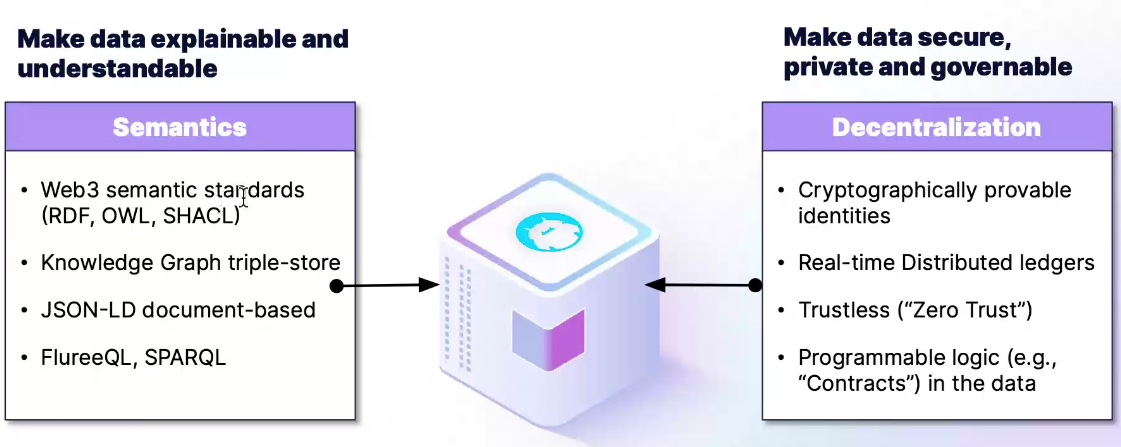Getting_started_with_fluree
- Use of Data is evolving
- Solution: Collaborative Data Network
- semantics of data shouldn't sit in the app
- web3 semantics standards (rdf, owl, shacl); Knowledge Graph Property Graph Database; JSON-LD; Flureeql
- decentralization
- cryptographically provable identities
- real-time distributed ledgers
- trustless
- programmable logic (i.e., Contracts
- "much of programmability can be contained in the data and its constraints"
 )
)- Time Travel
- Collaboration
- Fluree's immutability allows rewind
- Compose Queries across data
- future: reasoning and inferencing
Questions
- Q: how do you represent relations, ie. object properties
- Q: can @type (Private) have multiple keys, i.e., multiple inheritance/class-membership
- A: Yes absolutely! Any instance can explicitly belong to multiple types, and inheritance can be multi-tiered
- no need for Object Relational Mapping
- Q: do you see a need for some kind of object mapping SDK for marshalling data into code? maybe you have recommendation for existing json-to-plain-old-*-objects libraries?
- A: It depends on your programming language as to if this is desirable or not. Many today are very comfortable working directly with data structures as a first-class citizen, but we may have some speciifc library support for languages that very object-centric. Even something like Java would be fairly easy to have a contructor to put JSON into an object without a library hopefully.
- Q: There's Time-Travel support for "Transaction Time", but do you have any thoughts about time-travel for "valid time", aka
Other people's questions
- Q: the current example seems related to foaf ontology, do you have predefined vocabularies available like vcard, dc, skos, etc?, or do we have to include them from scratch?
- A: The demo isn't using any pre-defined vocabulary, but absolutely can use any RDF-based ontology. Inferencing is largely limited today to RDFS-based descriptions, but we do have some limited OWL-based ontology support which I mentioned will be much more broad shortly (and in a very unique Fluree-like way).
- Q: is there support for delegation/policy chains? For example: Person A has created the database. Person B gets read and write access to entity type A and B. In the case of a delegation chain; person B would be able to give (a subset of) the rights to what it can do to yet another person
- A: Since policies are data, you can make policies about policies
- Q: Access control?
- A: REBAC: relationship-based access control
- A: multiple policy groups are "only one has to succeed" but you can express AND conditions
 )
)